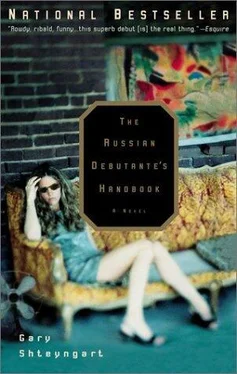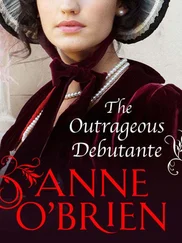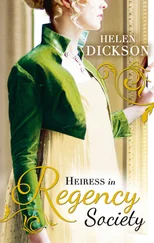Gary Shteyngart - The Russian Debutante's Handbook
Здесь есть возможность читать онлайн «Gary Shteyngart - The Russian Debutante's Handbook» весь текст электронной книги совершенно бесплатно (целиком полную версию без сокращений). В некоторых случаях можно слушать аудио, скачать через торрент в формате fb2 и присутствует краткое содержание. Город: New York, Год выпуска: 2003, ISBN: 2003, Издательство: Riverhead Books, Жанр: Современная проза, Юмористическая проза, на английском языке. Описание произведения, (предисловие) а так же отзывы посетителей доступны на портале библиотеки ЛибКат.
- Название:The Russian Debutante's Handbook
- Автор:
- Издательство:Riverhead Books
- Жанр:
- Год:2003
- Город:New York
- ISBN:0-7865-4177-6
- Рейтинг книги:4 / 5. Голосов: 1
-
Избранное:Добавить в избранное
- Отзывы:
-
Ваша оценка:
- 80
- 1
- 2
- 3
- 4
- 5
The Russian Debutante's Handbook: краткое содержание, описание и аннотация
Предлагаем к чтению аннотацию, описание, краткое содержание или предисловие (зависит от того, что написал сам автор книги «The Russian Debutante's Handbook»). Если вы не нашли необходимую информацию о книге — напишите в комментариях, мы постараемся отыскать её.
and
. The Russian Debutante’s Handbook Bursting with wit, humor, and rare insight,
is both a highly imaginative romp and a serious exploration of what it means to be an immigrant in America.
The Russian Debutante's Handbook — читать онлайн бесплатно полную книгу (весь текст) целиком
Ниже представлен текст книги, разбитый по страницам. Система сохранения места последней прочитанной страницы, позволяет с удобством читать онлайн бесплатно книгу «The Russian Debutante's Handbook», без необходимости каждый раз заново искать на чём Вы остановились. Поставьте закладку, и сможете в любой момент перейти на страницу, на которой закончили чтение.
Интервал:
Закладка:
Got it! It’s special because it’s not special, and hence it makes Cohen feel special for choosing it. Special and different. He was different for coming to Prava and now he had validated his difference once more by choosing this place. Vladimir was ready to proceed. “Perry, I want you to make me a writer,” he said.
Cohen was instantly on his feet again, towering over Vladimir with his hands raised expectantly, as if any moment now they were going to hug over some declaration, ruffle each other’s hair over a mutual understanding. “A writer or a poet?” he asked, his breathing now as rapid as that of an older, corpulent man.
Vladimir thought about it. Poetry would probably take less time per unit. Surely that was why Cohen had chosen it. “A poet.”
“Have you read much?”
“Well…” Vladimir entertained a poetic list that would have made Baobab proud: “Akhmatova, Wolcott, Milosz…”
No, no. Cohen didn’t want to hear about them.
“Brodsky? Simic?”
“Stop right there,” Cohen said. “See, like too many poets starting out, you’ve already read too much. Don’t look at me like that. It’s true. You’re overread. The whole point of coming to the Old World is to chuck the baggage of the new.”
“Oh,” Vladimir said.
“Reading has nothing to do with writing. The two are diametrically opposed, they cancel each other out. Look, I need to know, Vladimir, do you really want me to be your mentor? Because if you do, you should be aware that it will involve some risk-taking.”
“Art without risk is stasis,” Vladimir said. “I told you that I wanted to be a poet, so I shall place myself in your hands, Perry.”
“Thank you,” Cohen said. “That’s very kind of you to say. And very brave. May I…?” They had the hug for which Cohen had been preparing, Vladimir hugging back with all his might, pleased that the day had already netted him two good friends (Kostya being the first). Indeed, caught in the fine-smelling Cohen’s embrace, Vladimir decided to put the Iowan Jew in the basement of his pyramid scheme’s pyramid, down where the dollars and Deutsche marks were to be stacked beneath the promissory notes.
“Perry,” he said. “It is obvious we will be friends. You’ve taken me into your world, now I must reciprocate. As it happens to be, I am a fairly rich man and not without some influence. I wasn’t kidding when I said my company was developing talent.”
The next two cryptic lines had come to him during the biznesmenski lunch. He had had the good sense to jot them down inside his palm. “Talent, Perry, may be an ocean liner with only a few staterooms, but I can’t let people like you spend your life in steerage. Will you allow me to make you wealthy?”
Cohen was moving closer in preparation for another hug. My God, another one! So this was Cohen when he wasn’t sitting around Eudora’s, deriding arrivistes for having less than two pens and suckling off the maternal teat—Cohen the gentle literary lion, the sweet-tempered dawdler of Stolovaya. Vladimir was suddenly happy to have submitted to his mentoring. Was that all it took to turn Cohen into an affectionate sap? Had Vladimir just single-handedly validated the young man’s place here in a tight, banal corner of Prava? Did he just make a friend for life?
At this point, the writer nearly had his arms around him, but when it was clear that no hug was forthcoming (Vladimir had his limits, after all), Cohen patted his shoulder instead, and said: “All right then, my financial Sherpa. Let’s go downtown and I’ll introduce you to my crowd.”
THEY TOOK Atram down the hill, so that the castle loomed above them once again. Now its palace facades were floodlit in artificial yellow while the cathedral extended its spires and crosses in a spectral green—two lovers that didn’t speak the same language.
Vladimir asked for a geography lesson as the tram rocked them back and forth on its journey across the Tavlata, heaving them into the neatly groomed old-timers who were entitled to their tram seats by law and derived a great, silent pleasure from watching the two standing foreigners tumble to their knees.
Cohen, like Kostya, was glad to play tour guide. He pointed at the passing landmarks, his fingers leaving nicotine smudges on the tram windows. There, on the hill, to the left of the castle, where they just talked “the talk” as it would later be known, where the roofs were tiled red and where the most important embassies and wine bars were clustered, that was called Malenka Kvartalka. “The Lesser Quarter!” Vladimir said, pleasantly surprised whenever his birth language intersected with Stolovan. But why this demeaning name for such a magnificent neighborhood? Cohen had no answer to that.
And where they were going—the “sea of spires” as seen from the morning’s first descent into the city, that was the Old Town. And to the south of the Old Town, the part of the city where the spires thinned out a bit and the roofs glimmered with more restraint, and the giant galosh of the Foot lorded over the proceedings like a phantom rubber commissar, was the New Town—which wasn’t so new, Cohen explained, dating back merely to the fourteenth century or so. “So what’s in the New Town?” Vladimir asked.
“The Kmart,” Cohen whispered with mock reverence.
AFTER CROSSING INTOthe Old Town, they drank many coffees in the plush if worn interior of the Café Nouveau, which ran amok with all the excesses of its namesake period: gilded mirrors, seats and carpets smothered in red velvet, the indispensable nymph of white marble. It was a long evening of listening to the ramblings of the young American on the subject of present-day poetry and art, the total of which left Vladimir feeling fortunate that he himself had no literary proclivities, harbored no bone-headed artistic intentions, else his meandering life would truly come to a bad end. After all, look where the delusional Cohen now found himself, and Cohen was a rich dandy, not some dismal Russian whose life chances were pretty lousy from the get-go.
AS VLADIMIR WASthinking these thoughts and nodding along to Cohen’s discourse, their environment began to improve. A Dixieland jazz ensemble (composed entirely of Stolovans) took to the stage, the joint began to swing, the pretty marble tables soon filled up with pretty boys and girls, and Cohen’s corner emerged as a popular destination.
Subsequently, it became hard for Vladimir to remember how many of America’s finest sons and daughters he met that particular night. Throughout the evening, he remembered being especially cold and aloof while lots of hands were given for him to shake as Cohen presented Vladimir Girshkin, international magnate, talent scout, and soon-to-be poet laureate.
Few knew what to make of him; Vladimir accepted this. And what did Vladimir make of them? Well, to start with, they were a fairly homogenous group—white middle Americans with a fashionable grudge, that was the lowest common denominator. Native-born folks who never had to struggle with the dilemmas of an alpha peasant or a beta immigrant because five generations down the road every affluent young American was entitled to the luxury of being second-rate. And here in fairyland Prava, bonded by the glue of their mediocrity, they stuck together as if they had all been born in the same Fairfax County pod, had all suckled the same baby-boomer she-wolf like so many Romuluses and Remuses. The rules were only different for obvious outsiders like Vladimir who had to perform some grand gesture—conduct the Bolshoi, write a novel, launch a pyramid scheme—to gain a modicum of acceptance.
He noted their clothes. Some were dressed in the flannels, which, Vladimir had noticed, were spreading by way of Seattle during his last month in the States. But the glam-nerd look, Francesca’s most tangible gift to Vladimir, was in evidence as well. The shirts way too tight, the sweaters too fluffy, the glasses too horn-rimmed, the hair coiffed either with seventies’ extravagance or fifties’ restraint. But look how much younger than Vladimir these specimens were! Twenty-one, twenty-two, maximum. Some probably couldn’t get served in American bars. He was old enough to be their teaching assistant.
Читать дальшеИнтервал:
Закладка:
Похожие книги на «The Russian Debutante's Handbook»
Представляем Вашему вниманию похожие книги на «The Russian Debutante's Handbook» списком для выбора. Мы отобрали схожую по названию и смыслу литературу в надежде предоставить читателям больше вариантов отыскать новые, интересные, ещё непрочитанные произведения.
Обсуждение, отзывы о книге «The Russian Debutante's Handbook» и просто собственные мнения читателей. Оставьте ваши комментарии, напишите, что Вы думаете о произведении, его смысле или главных героях. Укажите что конкретно понравилось, а что нет, и почему Вы так считаете.












